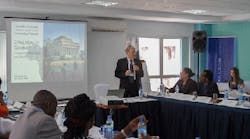New Columbia University partnership addresses oral health needs in East Africa
In Kenya, there is only one dentist for every 42,000 people. A new project of the Children's Global Oral Health Initiative is aiming to engage stakeholders from Kenya, Uganda, and Tanzania and improve oral health in East Africa.
Researchers from Columbia University Medical Center (CUMC) are collaborating with the University of Nairobi, Unilever East Africa, and the Columbia Global Centers | Africa to improve oral health care and disease prevention in East Africa and other resource-poor countries in the region. The project was officially launched at the East Africa Oral Health Summit, hosted in March at Columbia Global Centers | Africa in Nairobi, Kenya.
The project is part of the Children’s Global Oral Health Initiative of the International Family AIDS Program (IFAP) Global Health Program at Columbia, which includes CUMC’s schools of dental medicine, nursing, medicine, and public health. Additional key collaborators include the Ministries of Health in Kenya, Uganda, and Tanzania and the Kenya Dental Association.
READ MORE | New green toothpaste reveals biofilm
With only one dentist for every 42,000 people, Kenya falls far below the World Health Organization’s recommendation of one dentist for 7,000 people. In addition, the majority of dentists in Kenya are found in urban areas, leaving most rural Kenyans without access to oral health care. Poor oral health in rural populations has been associated with other significant health problems, such as diabetes, cardiovascular disease, and strokes, and absenteeism from work and school.
The Children’s Global Oral Health Initiative and its partners aim to improve oral health and related illnesses in Kenya, Uganda, and Tanzania by integrating oral health care into the countries’ health prevention and education initiatives. The program leaders hope to inform policy that can be tailored to local needs and implemented by the Ministries of Health in these three countries.
“We have chosen to initially engage stakeholders from Kenya, Uganda, and Tanzania because these three countries share a common history, ethnicity, and language and cooperate both politically and economically,” said Kavita P. Ahluwalia, DDS, MPH, director of Global Oral Health Initiatives for Africa and South Asia at the Columbia University College of Dental Medicine, and associate professor of dental medicine at CUMC. “We are prepared to work alongside them to support their vision of how best to address oral health needs.” The project is of particular important to Dr. Ahluwalia, who was born and raised in Nairobi.
Improving general understanding of the connection between dental health and systemic health among East Africans is an important part of the work, according to Christian Stohler, DMD, DrMedDent, dean of the Columbia University College of Dental Medicine, who attended the summit.
“The time has come for a radical change in our thinking about the importance of teeth and the mouth in terms of overall health,” said Dr. Stohler. “Left untreated, certain oral health-related diseases, such as oral cancer, can be fatal.”
READ MORE | Oral cancer screening: Where do we stand?
The summit included more than 100 leaders in oral health from Kenya, Uganda, Tanzania, and the United States, as well as high-level government officials and the highest-ranking dental officials from East African nations. The participants identified regional priorities and began defining next steps to address oral health needs. Sustainable models of oral care delivery were presented, including utilizing existing health care workers to offer preventive services and promote improved oral hygiene practices.
“The summit was a great success,” said Stephen W. Nicholas, MD, director of the IFAP Global Health Program, principal investigator of the Children’s Global Oral Health Initiative, and professor of pediatrics and population and family health at CUMC. "It far exceeded our expectations at every level, including in participation, attendance, and enthusiasm."
The project will also include a research component. In June, students from CUMC’s four schools will begin research in Kenya under the mentorship of Dr. Ahluwalia and Professor Regina Mutawe of the University of Nairobi.
Learnings from the project are expected to be applicable to other resource-poor countries in the region.
In an effort to improve oral health care in Kenya, Unilever’s Pepsodent toothpaste brand, in collaboration with the Kenya Dental Association, recently launched an educational program to encourage one million school children across the country to adopt—and promote within their families— better oral hygiene practices, including twice-daily tooth brushing. Unilever will provide Pepsodent toothpaste at a reduced price to encourage correct toothpaste dosage and improve the frequency of brushing.—Columbia University College of Dental Medicine press release 15 April 2016
